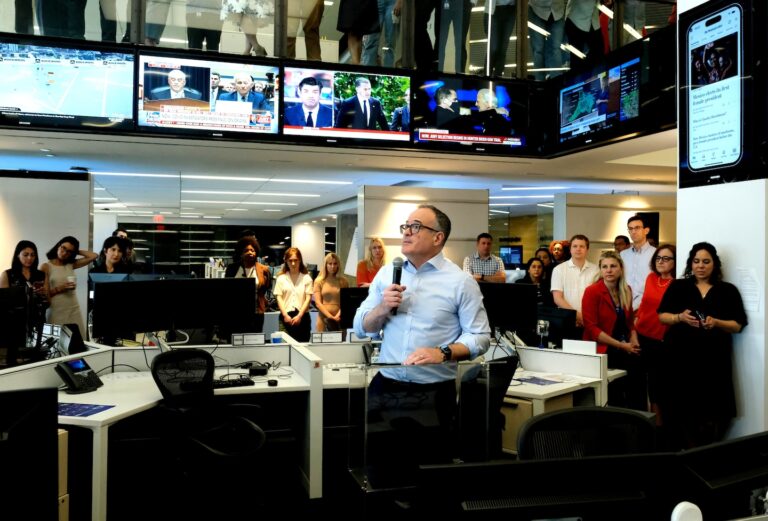Robert Winnett, 47, deputy editor of the Telegraph Media Group, has built his career in the UK but is still relatively unknown in the US.
Murray, in particular, was praised by former colleagues at the journal for his deep commitment to the article.
“He has always supported us in our investigations and been one of our biggest advocates,” said James V. Grimaldi, an investigative reporter for The Wall Street Journal and former Post reporter. “He is smart, thoughtful, a brilliant editor, has excellent judgment when it comes to making difficult decisions on important stories and has impeccable ethics and standards.”
A native of Bethesda, Maryland, Mr. Murray edited his high school newspaper before studying journalism at Northwestern University. He worked as a copy editor in Virginia and covered crime in Chicago before joining the Journal’s Pittsburgh bureau in 1994. He covered the banking industry and rose to management positions.
“He walks around the room and wants to know what you’re working on,” said one Journal staffer, who spoke on the condition of anonymity because he wasn’t authorized to comment. “He wants to get to the point.”
Gerald F. Seib, who worked closely with Mr. Murray as The Wall Street Journal’s Washington bureau chief, described him as a “calming presence” during a tumultuous period within the journal.
“He’s a really good guy. He listens to your family, he listens to your kids,” Seib added. “He doesn’t yell or throw things. He’s a surprisingly normal guy.”
In 1999, Murray published a memoir about his father’s decision to retire from civil service and enter a Benedictine monastery. “It felt like my family had fallen apart in a lot of ways,” he said in a 2020 interview. But “writing the book allowed me to think more deeply about my family’s history and patterns.”
After The Wall Street Journal published an investigation that found widespread conflicts of interest among federal judges in 2021, Murray urged his staff to investigate the financial disclosures of all federal employees. The resulting series, “Capital Assets,” won a Pulitzer Prize in 2023.
“He has a drive to propose, initiate, support and fund very ambitious journalism,” Grimaldi said. “As an editor, I couldn’t ask for more.”
Under Murray, the Wall Street Journal also made headlines for its reporting on the origins of the coronavirus, including questions about whether it leaked from a Chinese lab. “Our goal has always been, and continues to be, just to ask questions, see what we can find out, and follow the facts,” Murray told The Washington Post in 2021. “We’ve always tried to keep an open mind and follow any clues to the origins of the virus.”
He added that journalists can sometimes rely too heavily on experts: “As journalists you always have to be open to new evidence and new opinions and things that you think might contradict what you think is true,” Murray said.
Murray comes from a traditional reporting background and has embraced new media and new technologies since leaving The Wall Street Journal. That experience will serve him well in overseeing The Washington Post’s efforts to find new ways to reach readers and subscribers. He served as a senior consultant to the paper’s parent company, focusing primarily on AI technology. In a recent post in the Substack newsletter, Murray wrote that all corporate reporters should ask companies about their AI investments and plans to adopt AI.
“Beyond the speculation and novelty surrounding AI, there are countless stories to be told,” he writes.
Mr Winnett has worked at the Daily Telegraph for nearly 17 years, the last 10 as deputy editor, and was originally recruited from the Sunday Times by Mr Lewis, who was the paper’s editor-in-chief at the time.
In interviews with several colleagues at the Telegraph, Winnett (known as “Rob”) was described as a casually dressed man with a cheeky smile, who could be shy at times but who could behave like a “terrier” when it came to writing an article.
One journalist who has worked with Winnett said postal workers “have nothing to fear. They’ll enjoy having him as their boss and will quickly recognize his qualities.”
At The Sunday Times, Winnett was praised for his role in investigating the “cash for honour” scandal – a story that drew a link between political donations and the “life peerage” that entitles people to seats in the House of Lords – and he also played a central role in The Telegraph’s investigation into the misuse of expense accounts by a series of MPs that has rocked Britain’s political establishment.
The latter scoop was criticized as “checkbook journalism” — the paper reportedly paid more than $100,000 for computer disks stolen from a congressional dues office — but the investigation, based on an analysis of millions of data entries, was a blockbuster and led to the resignations of several staff members.
More recently, Winnett oversaw the leak to the Telegraph of more than 100,000 private WhatsApp messages between government ministers at the peak of the COVID-19 pandemic.
Tom Lawley, a former reporter who worked under Winnett at The Telegraph, called him a “Zen-like character” and said, “Quiet, very reserved, unflappable. There were definitely louder people in the newsroom. In the years I was there I never heard Rob raise his voice or anything. He always seemed calm and collected.” But that calm coexisted with “great impatience and impulsivity”, Lawley said.
“I don’t think it matters what the area of coverage is,” Lawrie said. “He wants the best coverage, the flashiest, the most impactful.”
While other senior editors were constantly replaced, “Rob was always in charge of the troops and breaking the news every day.”
Lawrie said his fondest memory of Winnett was sitting in the center of the newsroom, “leaning back in his chair, circling the 10th paragraph of a Financial Times article and then reading on. He was very detail-oriented and a real power behind the scenes, rather than a front-runner.”

